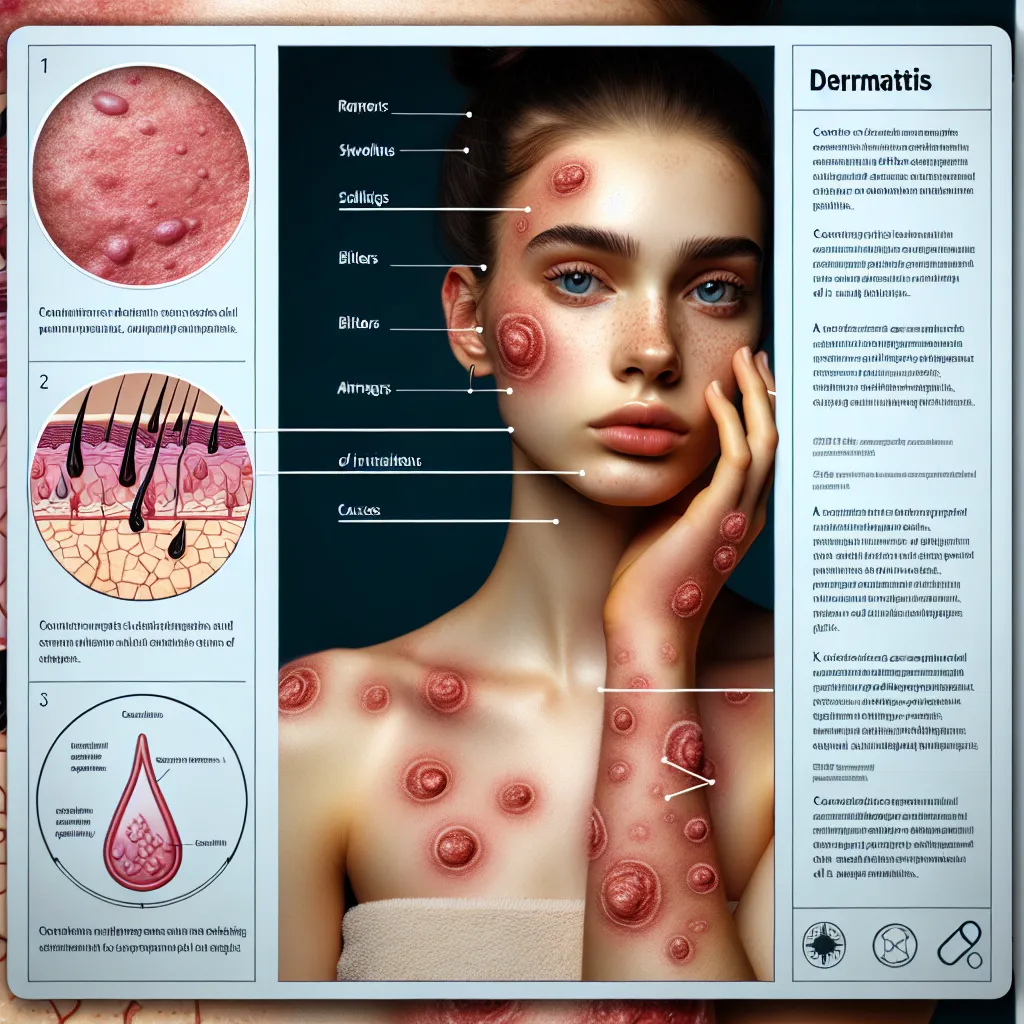Skin Dermatitis Pictures: Understanding the Symptoms and Causes
Skin Dermatitis Pictures: Understanding the Symptoms and Causes
Skin dermatitis, also known as eczema, is a common condition that affects millions of people worldwide. It is characterized by red, itchy, and inflamed skin that can be both uncomfortable and unsightly. Understanding the symptoms and causes of skin dermatitis is essential in managing and treating this condition effectively.
Symptoms of Skin Dermatitis
The symptoms of skin dermatitis can vary depending on the type and severity of the condition. Some common symptoms include:
- Redness and inflammation of the skin
- Itching and dryness
- Blisters or oozing of clear fluid
- Crusting or scaling of the skin
- Thickened or leathery skin
- Darkened or discolored patches
These symptoms can occur in different areas of the body, including the hands, face, neck, and creases of the elbows and knees. In severe cases, skin dermatitis can lead to painful cracks in the skin, which may increase the risk of infection.
Causes of Skin Dermatitis
The exact cause of skin dermatitis is still unknown, but several factors can contribute to its development. These include:
1. Genetic Factors
Research suggests that certain individuals may have a genetic predisposition to develop skin dermatitis. If you have a family history of the condition, you may be more susceptible to developing it yourself.
2. Environmental Triggers
Exposure to certain substances or allergens can trigger skin dermatitis in susceptible individuals. Common triggers include:
- Harsh chemicals and detergents
- Perfumes and fragrances
- Pollen and pet dander
- Mold and dust mites
- Extreme temperatures or humidity
3. Immune System Dysfunction
Problems with the immune system can also contribute to the development of skin dermatitis. Inflammation and an overactive immune response can lead to the characteristic symptoms of the condition.
Diagnosing Skin Dermatitis
If you suspect you have skin dermatitis, it is important to consult a dermatologist for an accurate diagnosis. The dermatologist will examine your skin and may perform tests to determine the cause of your symptoms. They may also ask about your medical history and any potential triggers that could be contributing to your condition.
In some cases, the dermatologist may request a skin biopsy to rule out other possible skin conditions and confirm the diagnosis of skin dermatitis.
Treatment Options
While there is no cure for skin dermatitis, several treatment options are available to manage and alleviate the symptoms. These include:
1. Moisturizers and Emollients
Regularly applying moisturizers and emollients can help hydrate the skin and reduce dryness and itching. Look for products that are fragrance-free and hypoallergenic to minimize the risk of further irritation.
2. Topical Steroids
In more severe cases, topical steroids may be prescribed to reduce inflammation and relieve itching. These medications should be used under the guidance of a healthcare professional to minimize potential side effects.

3. Antihistamines
Antihistamines can help alleviate itching and promote better sleep. They are available over-the-counter or in stronger formulations by prescription.
4. Avoiding Triggers
Identifying and avoiding triggers that worsen your symptoms is crucial in managing skin dermatitis. Keep a diary to track potential triggers and make lifestyle changes accordingly.
5. Wet Wrap Therapy
Wet wrap therapy involves applying a moisturizer to the affected area and covering it with a damp cloth or bandage. This can help soothe the skin and enhance the effectiveness of topical treatments.
6. Phototherapy
In some cases, exposure to ultraviolet (UV) light under medical supervision can help improve skin dermatitis symptoms. Phototherapy should only be administered by a healthcare professional.
Preventing Skin Dermatitis
While skin dermatitis cannot always be prevented, there are measures you can take to reduce your risk and manage the condition effectively:
- Avoid known triggers and irritants
- Moisturize regularly
- Use gentle, fragrance-free skincare products
- Wear protective clothing when handling chemicals or detergents
- Maintain good overall skin health
- Manage stress levels
Conclusion
Skin dermatitis, or eczema, can significantly impact the quality of life for those affected. Understanding the symptoms, causes, and available treatment options is essential for effective management. If you suspect you have skin dermatitis, consult a dermatologist for an accurate diagnosis and personalized treatment plan. By taking proactive steps and avoiding triggers, you can minimize flare-ups and lead a healthier, more comfortable life.
